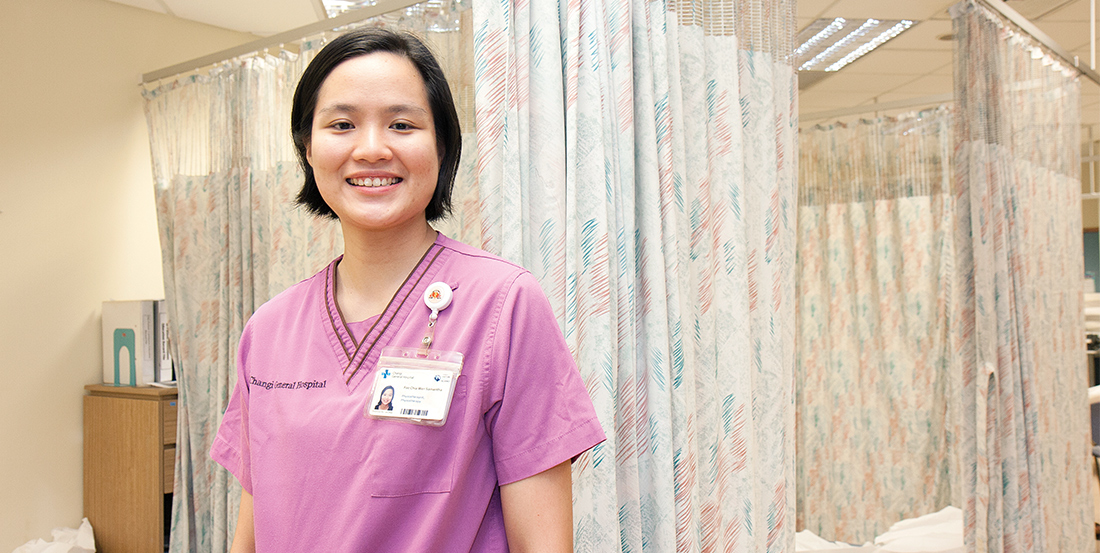A fter sustaining ankle and knee injuries during her teenage years, Samantha Foo Chia Wen had to undergo surgery and numerous physiotherapy sessions. It was during her many months of rehabilitation that Samantha began to take an interest in healthcare. Through the compassion and efforts shown by her physiotherapists, Samantha experienced first-hand what it meant to be part of a healthcare team. She developed an appreciation for the important and valuable role that physiotherapists play in helping patients get back on their feet.
Fast-forward to today, Samantha is now putting her interest into practice as a Physiotherapist.
What are your roles and responsibilities as a Physiotherapist?
Samantha Foo Chia Wen: My role as a physiotherapist is to prevent, assess and treat impairments to the human movement, which can be caused by physical disabilities, trauma or illnesses. The main function of a physiotherapist is to help restore and maximise patients’ mobility, function and independence.

Why are physiotherapists an important constituent in the healthcare equation?
Samantha: Physiotherapists are one of the key healthcare professionals specialising in human movement. With Singapore’s increasing ageing population, we often attend to elderly patients who have sustained bone fractures from a fall. Physiotherapists are there to assist patients in regaining their mobility post-injury. This assistance includes enabling patients to walk again with appropriate walking aids. On the other end of the spectrum, physiotherapists also play an important role in helping athletes and sportspersons achieve their sporting goals in a safe and effective manner.
The role of a physiotherapist sounds challenging. How do you overcome obstacles in your line of work?
Samantha: One of the challenges I face at work is interacting with people from all walks of life and communicating with them through different means and languages. While this is essential to being an effective physiotherapist, such tasks can be quite draining. Besides learning from my colleagues, I overcome such challenges by being open-minded in learning new communication methods and languages. Another challenge that I face at work is seeing a patient through recurring hospital admissions and sometimes, until their last breath. It helps that I have a group of supportive and understanding colleagues who are always there to remind me why we do what we do.

Samantha Foo Chia Wen
Healthcare Scholar
Designation:
Physiotherapist
What would you say is the most fulfilling aspect of your job?
Samantha: The most fulfilling aspect of my job is being able to accompany and help patients on their road to recovery. For example, an elderly patient could be bedbound after suffering a stroke. However, after weeks of hard work with the patient, seeing him or her walk out of the hospital brings about great satisfaction and fulfilment. In my opinion, this is really what sets the physiotherapy career apart from one in the corporate world.
Share with us one memorable episode you have had at work.
Samantha: I vividly remember an elderly lady who suffered from a hip fracture. After undergoing hip surgery, she developed memory loss, and she forgot that she had undergone surgery. When I approached her during the initial rehabilitation sessions, she was very apprehensive and reluctant to participate. As I attended to her every day, she became more relaxed and began greeting me with a smile and wave each time I approached her for therapy. The rapport and trust built over the days enabled her to achieve daily progress in terms of functional mobility – from struggling to get out of bed to eventually walking to the toilet with minimal assistance. Seeing her smile and progress each day was definitely heartening and made everything worth it.
As a Healthcare Scholar, how did your undergraduate studies help in developing your skillsets?
Samantha: As an undergraduate, it was a requirement for me to undergo various clinical attachments with different areas of specialisation. The clinical attachments were an opportunity to apply the theories and knowledge learnt in school into the clinical setting. Being fairly introverted, one of the challenges that I faced was having to step out of my comfort zone. For example, I had to take the initiative to ask questions and try new things, so that I could maximise my learning at each clinical attachment. Each attachment moulded my clinical knowledge and skills to be a practising physiotherapist. It also allowed me to gradually improve my communication skills by providing a less intimidating environment for me to ask questions!
What advice would you have for aspiring Healthcare Merit Award recipients?
Samantha: A career in healthcare definitely requires empathy and patience as well as passion for what you do. In order to determine if healthcare is really for you, I would advise you to go on observational attachments for the various professions that you might be interested in. Although online research might provide some information, nothing beats seeing first-hand what each profession is all about and hearing from professionals themselves. Once you have gained enough understanding of the profession and feel that this is the right career for you, don’t hesitate to take up the scholarship and begin an exciting journey!

